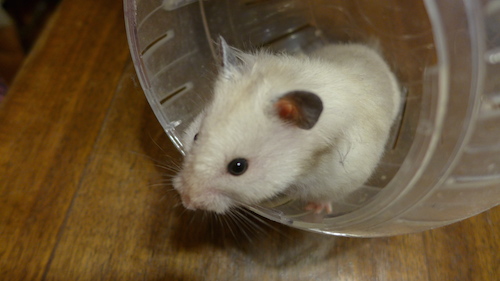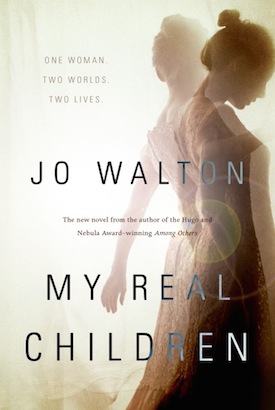Posted by Abi Sutherland at 02:41 PM * 47 comments
Once again, I find myself opening a discussion thread for a film I haven’t seen. While this allows me to safely avoid any spoilers in the original post (a good thing), it does also give me free rein to imagine what those spoilers might be (a thing of dubious value).
IMDB tells me this film depicts how “the X-Men send Wolverine to the past in a desperate effort to change history and prevent an event that results in doom for both humans and mutants.”
Now, for my money, it’s not a proper time travel story if it doesn’t involve at least one of the following elements:
- A blue box
- Robert Lansing holding a cat
- a dead grandparent
- transparent aluminum
- the Bishop’s Bird-Stump
- a DeLorean
- a rabbit costume
- Eloi and Morlocks; Tanu and Firvulag
- miller-guns
- something unpleasant in a microwave oven
I am now imagining Wolverine using all of the above items to fulfil his mission. Quick, while I’m distracted, discuss the movie!
Posted by Teresa at 10:17 AM * 36 comments

Hamster in her ballZerika is sufficiently intrepid that it took us weeks to realize she can’t see much more than dark vs. light, and then only if it’s very close to her.
maps the world by smell and sound:
eager, alert, blind.
Actually, it was Pippin Macdonald who figured it out during a weekend visit. Patrick and I had had suspicions, but hadn’t yet put it all together. Among other things, it explains why Zeek, alone among all our hamsters, has moved all her cage furniture: she navigates by following the walls.
(Photo: Zerika, with her elegant Siamese-cat fur and her very curious nose. She loves her hamsterball.)
Socializing a blind hamster is an interesting challenge.
As far as I can tell, Zeek doesn’t think this is tragic. She thinks she’s having a good time.
Posted by Patrick at 11:56 AM * 150 comments
 On sale today in the US, Canada, and the open market. Forthcoming in the UK and various parts of the Commonwealth on August 21. You can read the first seven chapters of it here. The schedule of Jo Walton’s tour for My Real Children can be found on the front page of her own site, here.
On sale today in the US, Canada, and the open market. Forthcoming in the UK and various parts of the Commonwealth on August 21. You can read the first seven chapters of it here. The schedule of Jo Walton’s tour for My Real Children can be found on the front page of her own site, here.
My flap copy:
It’s 2015, and Patricia Cowan is very old. “Confused today,” read the notes clipped to the end of her bed. She forgets things she should know—what year it is, major events in the lives of her children. But she remembers things that don’t seem possible. She remembers marrying Mark and having four children. And she remembers not marrying Mark and raising three children with Bee instead. She remembers the bomb that killed President Kennedy in 1963, and she remembers Kennedy in 1964, declining to run again after the nuclear exchange that took out Miami and Kiev.
Her childhood, her years at Oxford during the Second World War—those were solid things. But after that, did she marry Mark or not? Did her friends all call her Trish, or Pat? Had she been a housewife who escaped a terrible marriage after her children were grown, or a successful travel writer with homes in Britain and Italy? And the moon outside her window: does it host a benign research station, or a command post bristling with nuclear missiles?
Two lives, two worlds, two versions of modern history; each with their loves and losses, their sorrows and triumphs. Jo Walton’s My Real Children is the tale of both of Patricia Cowan’s lives…and of how every life means the entire world.
Some advance reviews and quotes:
“The most astounding mixture of joy and sorrow I have ever felt…My Real Children is a story of pure love without an ounce of sentimentality, infinitely wise about the human condition, parenting, and family. It changed the way I think about the very meaning of life. By playing Cowan’s two lives against each other, Walton has brilliantly illuminated something raw and true about where happiness comes from, and where it leads. Walton’s last novel, Among Others, was one of the best novels of 2011, winning the Hugo, Nebula, and British Fantasy Awards. If anything, My Real Children surpasses it.”
—Cory Doctorow, Boing Boing
“My Real Children has as much in common with an Alice Munro story as it does with, say, Philip K. Dick’s The Man in the High Castle. It explores issues of choice and chance and destiny and responsibility with the narrative tools that only science fiction affords, but it’s also a deeply poignant, richly imagined book about women’s lives in 20th- and 21st-century England, and, in a broader sense, about the lives of all those who are pushed to the margins of history: the disabled, the disenfranchised, the queer, the lower middle class. My Real Children is a quiet triumph, not least because whatever life Patricia happens to be living at any given moment, she remains deeply and recognizably herself. Good novels show us a character’s destiny as an expression of who they fundamentally are. What most novels do only once, My Real Children does twice.”
—Lev Grossman, Publishers Weekly
“My Real Children starts quietly, then suddenly takes you on two roller-coaster rides at once, swooping dizzily through a double panorama and ending in a sort of super Sophie’s Choice. A daring tour de force.”
—Ursula K. Le Guin
“In her essay on Iain Banks’s The Crow Road, Walton wonders why more SF authors don’t write in a manner closer to Banks’s mainstream fiction. Why aren’t there more ‘SF stories that are about people but informed with the history that is going on around them’? My Real Children reads like her answer to that question. […] At first glance, one is reminded of the movie Sliding Doors, in which one character is followed along diverging paths, but Walton digs deeper. It’s not just that Cowan is living two lives; she is actually living in two alternate histories, neither of which is the ‘true’ world Walton’s readers inhabit. […] It is unclear whether Walton has wrapped a literary novel around SF tropes, or crafted a subtle genre novel featuring achingly beautiful prose and carefully crafted characters. Ultimately, it doesn’t matter. Walton has created an SF story focused on characters and informed by the world around them. My Real Children is the rarest sort of novel—one that transcends genre. It is a book that, one surmises, will be eagerly reread as the years pass.”
—Quill & Quire
“Keep some tissues ready; I wept with joy and grief, prayed for someone’s health, and shivered with fear. Throughout, Patricia’s steadfast strength inspired me. […] I feel as though I’ve gotten to read another book about Taveth from Jo Walton’s Lifelode, in a way, in how thoroughly I see that Patricia’s housekeeping and parenting and teaching and writing and peace work are all of a piece—all her work is love made visible. Walton pays attention to the concrete domestic details of real people’s lives. There’s a moment where Patricia and her partner have to buy another pillow the first time they have an overnight houseguest. This is science fiction written by a host, someone who reflexively practices hospitality both in her social life and in her fiction.”
—Sumana Harihareswara, Cogito, Ergo Sumana
“A wonderfully absorbing novel about how one woman’s decision can change the course of history. I lost sleep reading it, and dreamed about it when I did sleep.”
—Delia Sherman
“A dizzying array of astonishments unfolding, a Chinese box of surprises. Once started, it is extraordinarily difficult to put this book down, even for dinner, even for bed.”
—Jane Yolen
“A masterpiece of personal and political worldbuilding…With its finely-observed treatment of human interpersonal relationships, this novel is as good as Walton’s previous alternate historical masterworks Farthing and Tooth and Claw. I know of few other authors who are so deft at evoking the complicated relationship between international politics and domestic dysfunction. No matter how outlandish the social context she’s built, however, Walton’s true strength lies in creating characters you come to know intimately—and whose lives you care about intensely, especially when they fall apart. You may find yourself in tears by the end of My Real Children, but you won’t regret a single second you spend engrossed in its pages.”
—Annalee Newitz, io9.com
“No one plays with genre categories like Jo Walton, sailing calmly through boundaries and borders as if they didn’t exist.”
—Lisa Goldstein
“[T]here is a deliberateness in [My Real Children’s] every moment and movement, no matter how small. The cruelties are horrific and heart-breaking, but economically so; the happinesses are writ small, but glow fiercely. There is a restraint throughout that is part of Patricia’s personality, an evenness and a fairness in the face of enormous life events which I found tremendously compelling.”
—Amal El-Mohtar, NPR.org
“Walton has written alternate history before, but here she takes the idea a step further, exploring the relationship between personal and public histories, inviting us to consider whether we’d prefer a happy life in a miserable world, or a miserable life in a happy world. The version of Patricia that accepts the proposal (‘Tricia’ and later ‘Trish’) ends up in a loveless marriage with a failed academic, but in a world in which President John F. Kennedy survives to run for re- election and a moon colony is established by the 1980s.
The other Patricia (‘Patty’ and later ‘Pat’) becomes a successful travel writer and finds a long-term, loving same-sex relationship with a botanist named Bee—but here the Cuban missile crisis leads to nuclear devastation. What makes the novel particularly poignant is that we first meet Patricia as a 90-year-old in a nursing home who somehow remembers both lives, leading the attendants to believe she’s confusing fantasy with reality. But her confusion over her own and the world’s past, and over which sets of children are her ‘real’ children, lends the novel a haunting, meditative quality and makes the two Patricias into one unforgettable character.”
—Gary K. Wolfe, Chicago Tribune
Posted by Abi Sutherland at 05:11 PM * 176 comments
It occurs to me that we might benefit from a spoileriffic thread for the Hugo novels. It would be a lot easier to talk about the nominees without having to lapse into ROT-13 all the time.
So if you don’t want to know about the time the Justice of Toren visited Shin-Tethys with a load of crates stamped “SymboGen”, or why Faye Vierra thought that one of them was a good place to hide from the Aes Sedai, maybe skip this thread.
But if you do want to talk about the nominees, about what worked and what didn’t, and how you’re thinking of voting, and why, here’s a place to do it.
To remind everyone, the Hugo nominees for Best Novel are:
- Ancillary Justice by Ann Leckie
- Neptune’s Brood by Charles Stross
- Parasite by Mira Grant
- Warbound, Book III of the Grimnoir Chronicles by Larry Correia
- The Wheel of Time by Robert Jordan and Brandon Sanderson
Mod note: Making Light has already seen a lot of discussion of the nomination process, the reasoning behind some of the nominations, and assorted related issues in our community. I trust it’s clear to everyone that this thread is not intended to rehash or continue that conversation. Nor is it a venue to parachute into with a single comprehensive post and then flap off again. Come to discuss, listen, and learn…or don’t.